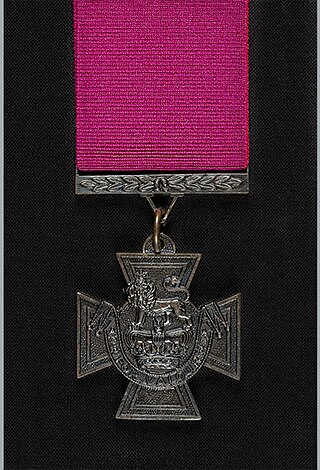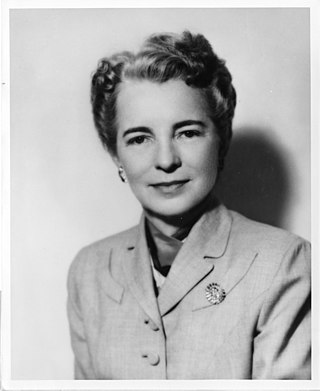
A registered nurse (RN) is a nurse who has graduated or successfully passed a nursing program from a recognized nursing school and met the requirements outlined by a country, state, province or similar government-authorized licensing body to obtain a nursing license. An RN's scope of practice is determined by legislation, and is regulated by a professional body or council.
The year 1902 in science and technology involved some significant events, listed below.

The Selective Service System (SSS) is an independent agency of the United States government that maintains information on U.S. citizens and other U.S. residents potentially subject to military conscription and carries out contingency planning and preparations for two types of draft: a general draft based on registration lists of men aged 18–25, and a special-skills draft based on professional licensing lists of workers in specified health care occupations. In the event of either type of draft, the Selective Service System would send out induction notices, adjudicate claims for deferments or exemptions, and assign draftees classified as conscientious objectors to alternative service work. All male U.S. citizens and immigrant non-citizens who are between the ages of 18 and 25 are required by law to have registered within 30 days of their 18th birthdays, and must notify the Selective Service within ten days of any changes to any of the information they provided on their registration cards, such as a change of address. The Selective Service System is a contingency mechanism for the possibility that conscription becomes necessary.

Compulsory military training (CMT), a form of conscription, was practised for males in New Zealand between 1909 and 1972. Military training in New Zealand has been voluntary before then and ever since.

Ellen Dougherty, a New Zealand nurse, was the first Registered Nurse in the world.

The Liberal Government of New Zealand was the first responsible government in New Zealand politics organised along party lines. The government formed following the founding of the Liberal Party and took office on 24 January 1891, and governed New Zealand for over 21 years until 10 July 1912. To date, it is the longest-serving government in New Zealand's history. The government was also historically notable for enacting significant social and economic changes, such as the Old Age Pensions Act and women's suffrage. One historian described the policies of the government as "a revolution in the relationship between the government and the people".

The Victoria Cross (VC) is the highest and most prestigious award of the British honours system. It is awarded for valour "in the presence of the enemy" to members of the British Armed Forces and may be awarded posthumously. It was previously awarded by countries of the Commonwealth of Nations, most of which have established their own honours systems and no longer recommend British honours. It may be awarded to a person of any military rank in any service and to civilians under military command. No civilian has received the award since 1879. Since the first awards were presented by Queen Victoria in 1857, two-thirds of all awards have been personally presented by the British monarch. The investitures are usually held at Buckingham Palace.
Elizabeth Grace Neill was a nurse from New Zealand who lobbied for passage of laws requiring training and national registration of nurses and midwives; in 1901, New Zealand was the first country in the world to introduce such laws. The nursing experience she received during her early life inspired her to reform many aspects of the nursing practice, and her experience as a factory inspector led her to instigate other social reforms.
Nursing in New Zealand is a specialist career with advanced educational requirements. Since the 19th century, the profession has evolved from on-the-job training in hospitals to a degree-level profession studied in technical institutes and universities. Due to New Zealand's geographic and geopolitical position, the country's nursing profession is both the subject of brain drain to larger nations and the recipient of brain drain from others.

The Royal College of Midwives (RCM) is a British midwives organisation founded in 1881 by Louisa Hubbard and Zepherina Veitch. It has existed under its present name since 1947, and is the United Kingdom's only trade union or professional organisation for midwives and those that support them. Gill Walton is the current Chief Executive.
Robert Haldane Makgill, CBE was a New Zealand surgeon, pathologist, military leader and public health administrator.
Flora Jean Cameron was a New Zealand nurse, nursing instructor and administrator.
Jessie Bicknell was a New Zealand civilian and military nurse, and a health administrator. She served in World War I and was made an Associate of the Royal Red Cross for her service.

Lucile Petry Leone was an American nurse who was the founding director of the Cadet Nurse Corps in 1943. Because the Nurse Corps met its recruiting quotas, it was not necessary for the US to draft nurses in World War II. She was the first woman and the first nurse to be appointed as Assistant Surgeon General of the United States Public Health Service.
The timeline of nursing history in Australia and New Zealand stretches from the 19th century to the present.

Palmerston North Hospital is the main public hospital in Palmerston North, New Zealand. The hospital is located at the northern end of Ruahine Street, 2 km (1.2 mi) northeast of The Square. It is the main hospital run by the MidCentral District Health Board, which primarily serves Palmerston North and the surrounding Manawatu, Tararua and Horowhenua districts.
Nurse licensure is the process by which various regulatory bodies, usually a Board of Nursing, regulate the practice of nursing within its jurisdiction. The primary purpose of nurse licensure is to grant permission to practice as a nurse after verifying the applicant has met minimal competencies to safely perform nursing activities within nursing's scope of practice. Licensure is necessary when the regulated activities are complex, require specialized knowledge and skill and independent decision making.
The history of nursing in the United Kingdom relates to the development of the profession since the 1850s. The history of nursing itself dates back to ancient history, when the sick were cared for in temples and places of worship. In the early Christian era, nursing in the United Kingdom was undertaken by certain women in the Christian Church, their services being extended to patients in their homes. These women had no real training by today's standards, but experience taught them valuable skills, especially in the use of herbs and folk drugs, and some gained fame as the physicians of their era. Remnants of the religious nature of nurses remains in Britain today, especially with the retention of the job title "Sister" for a senior female nurse.
The Nurses Registration Act 1919 was an Act of Parliament of the United Kingdom









